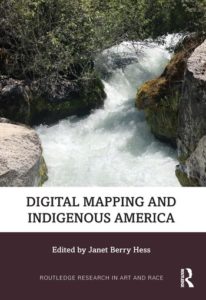Writing
Book Chapters
 "Networking the Nation: Settler Colonialism as Analytic in Critical Infrastructure Studies" in Critical Infrastructure Studies & Digital Humanities, edited by Alan Liu, Urszula Pawlicka-Deger, and James Smithies. University of Minnesota Press.
"Networking the Nation: Settler Colonialism as Analytic in Critical Infrastructure Studies" in Critical Infrastructure Studies & Digital Humanities, edited by Alan Liu, Urszula Pawlicka-Deger, and James Smithies. University of Minnesota Press.
From abstract: This chapter considers how a methodology attentive to settler colonialism allows us to identify the ideological and material/territorial projects of settler colonialism in relation to the development and maintenance of internet and communications infrastructures in the US and reviews major interventions and contributions to the field of settler colonial studies. I prioritize the work of Black, Native, Indigenous, Aboriginal, and First Nations feminist scholars… I am continually struck by the elision of the settler state, settler colonial private property regimes, and reticence to meaningfully acknowledge settler culpability in our work. Too often humanities scholars and DH scholars alike couch their discourse in the rhetoric of democratic ideals, the public good, or the commons, without attention to the settler colonial ideologies these concepts are predicated upon. As a result, discourses couched in such logics are inherently limited by their reliance on settler state juridical interventions and fail to recognize their own investment in neoliberal progressive politics. The use of settler colonial studies as a robust framework asks us to re-orient our arguments and to re-evaluate how we might imagine anti-colonial and liberatory technologies.

“Alive with Story: Mapping Indigenous Los Angeles and Carrying Our Ancestors Home” in Digital Mapping and Indigenous America, edited by Janet Berry Hess. Routledge.
Abstract: As part of a continuum of resistance, digital projects and repositories offer platforms to reckon with settler representations of space and peoples. Two projects, Mapping Indigenous Los Angeles (MILA) and Carrying Our Ancestors Home (COAH), redress the relationship between Native and Indigenous bodies, communities, and land as they provide pedagogical tools for tribal communities, institutions, and settlers to dismantle settler colonial narratives. Mapping Indigenous LA unsettles colonial cartographic and geographic knowledge as it weaves together the stories of the Native and Indigenous inhabitants who originally occupied and have come to occupy Los Angeles as the result of complex relocations and diasporic processes. Indigenous digital counter-mapping projects confront and re-orient the colonial gaze through a nuanced rendering of relationships with space, place, and memory. Carrying Our Ancestors Home addresses the history and intricacies of repatriation and offers insight into how tribal communities and institutions address the Native American Graves Protection and Repatriation Act (NAGPRA). Digital repositories and archives facilitate the preservation of cultural heritage and lifeways while simultaneously evidencing the legacy of political mobilization and current activism by Native communities. Though largely based on Gabrielino/Tongva lands (Los Angeles), these projects seek to build solidarity amongst and serve as repositories for global Native, Indigenous, and Aboriginal communities.
Book Reviews & Contributions
» Strong Hearts and Healing Hands: Southern California Indians and Field Nurses, 1920-1950 by Clifford E. Trafzer for California History. University of California Press, 2022. DOI: 10.1525/ch.2022.99.2.95
» Network Sovereignty: Building the Internet Across Indian Country by Marisa Elena Duarte for Catalyst: Feminism, Theory, Technoscience, 2019. DOI: 10.28968/cftt.v5i2.31966
» Weaponizing Maps: Indigenous Peoples and Counterinsurgency in the Americas by Joe Bryan and Denis Wood for Great Plains Research. University of Nebraska-Lincoln, 2017. DOI: 10.1353/gpr.2017.0026
- "Emerging LGBT Scholars Reflect on Dawn of Trump Presidency" for OutHistory.org (2017)
- Excerpt: "The ideology and political, imperialist practices of this country are deeply invested in a white supremacist capitalist heteropatriarchy. The creation of this country was and remains contingent upon the dispossession of Native peoples and the systematic denial of their sovereignty. The American economy was built upon the backs of Black slave labor. It remains contingent upon the exploitation of people of color both here and abroad. This was never a place that offered recognition or protection to Black folks, Native folks, or queer folks of color. The promises of citizenship and legal recognition or protection have largely been illusory…We cannot build radical communities or movements if we do not grapple with these realities, [and we] cannot afford to confuse progress towards social justice with neoliberal politics. To celebrate our existence is not enough, and our mobilization in the wake of a Trump regime means that coalition building is crucial." Read more.
“Queer Politics are Everyone’s Politics.” La Voz de Esperanza, The Esperanza Peace and Justice Center. San Antonio (2009).
DH Coursework
- Excerpt: "My work is centered on what Mishuana Goeman (Tonawanda Band of Seneca) terms “unsettling settler notions of space.” I teach colonialism and settler colonialism as gendered, nation-building projects and connect these histories to the development of computer technology and its attendant infrastructures. I argue that the sub-areas of critical information studies, critical infrastructure studies, and critical code and algorithmic studies, as well as a methodology informed by intersectional feminism and settler colonial studies, are imperative and inseparable from the project of teaching students how to “use” digital tools. It is critical that we challenge the “mastery” of tools in DH classrooms and see technologies as artifacts which are deeply entrenched in colonialism, settler colonialism, late capitalism, and the project of globalization. This approach also allows us to critically asses how information circulates, the politics of online representation, and to consider forms of technological appropriation and resistance without participating in the continued erasure of, for instance, Native and Indigenous peoples. Further, this allows us to consider the impact of constituent epistemologies and ontologies." Read more here.
- "What is DH?" excerpt: "DH understands that who we are matters as much as what we make...DH is reflective, and reflexive. DH projects are highly collaborative efforts, marrying the skill sets and scholarly approaches of those involved into a robust team. Ideally, DH projects themselves are as much about learning as they are about teaching." Read more here.
Excerpt: “The George P. Johnson Negro Film Collection, 1916-1977 spans 71 boxes and features over 35 linear feet of content. Our team spent several weeks working with the collection, pouring over Johnson’s thorough documentation and preservation of black cultural production and black representation in the United States and abroad. We hoped to move through the archive and allow the story to emerge organically from Johnson’s collection. In the process, we were captivated by the story of George Johnson, Noble Johnson, and the legacy of the Lincoln Motion Picture Company. It was an honor and privilege to handle the hand-cut and thoughtfully indexed artifacts, to spend hours looking through beautiful film stills and photographs, and to learn about the incredible histories of the people who contributed to the Race Film industry.” -Sarah Montoya, Adelaide Kuehn, Sarah Ohanian, and Aitana Balam. Read the full exhibit description here.
- DH 250: Project structure on Github
- Chicanx 291: excerpt "This class marked an important theme in the work I would continue to do with GIS around central questions like: How do you populate a place with a story in a meaningful way (fictional or otherwise)? What does mapping tell us about power, colonialism, and imperialism -- historically and in our current moment? What possibilities or alternate pasts/ futures are made possible through the combination of narrative/mapping?" Read more here.